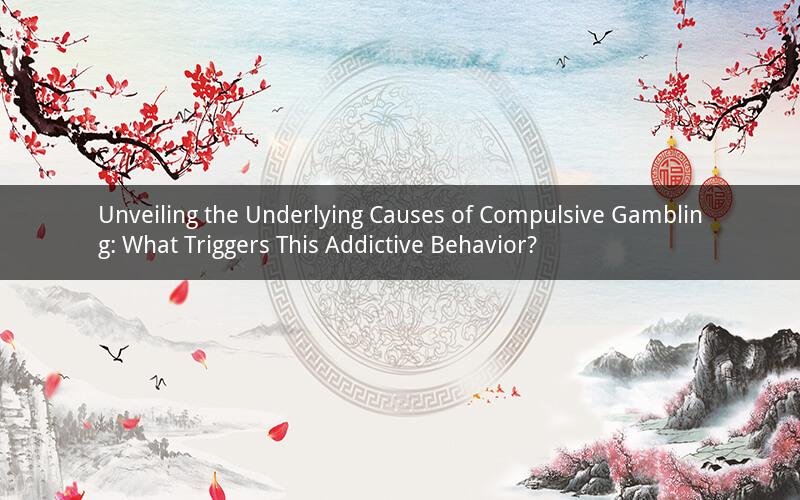
Compulsive gambling, also known as gambling addiction, is a complex disorder that affects individuals of all ages, backgrounds, and socioeconomic statuses. Understanding the factors that trigger this addictive behavior is crucial in identifying potential prevention strategies and effective treatments. In this article, we will delve into the various triggers that may lead to compulsive gambling, shedding light on the psychological, social, and environmental factors that contribute to this dangerous addiction.
1. Psychological Factors
a. Low self-esteem: Individuals with low self-esteem may turn to gambling as a means to escape from their feelings of inadequacy and gain a sense of accomplishment. The thrill of winning can temporarily boost their self-esteem, making them crave more.
b. Depression: Depression is often associated with gambling addiction, as individuals may use gambling as a coping mechanism to alleviate their symptoms. However, this temporary relief can lead to a dangerous cycle of addiction.
c. Anxiety: People with anxiety disorders may seek the excitement of gambling to distract themselves from their worries and fears. The high-risk, high-reward nature of gambling can provide a temporary relief from anxiety symptoms.
d. Impulse control disorders: Compulsive gambling can be triggered by impulsivity, which is the inability to control one's actions and thoughts. Individuals with impulsivity disorders may be more susceptible to developing a gambling addiction.
2. Social Factors
a. Peer pressure: People who are surrounded by friends or family members who gamble may be more likely to develop a gambling addiction themselves. The desire to fit in and be accepted can lead individuals to engage in risky behaviors.
b. Family history: Research suggests that there is a genetic component to compulsive gambling. Individuals with a family history of gambling addiction may be more prone to developing this disorder.
c. Media exposure: The portrayal of gambling in movies, television shows, and advertisements can trigger addictive behavior. The glamorous and exciting nature of gambling can make it seem appealing to vulnerable individuals.
d. Social support: A lack of social support can contribute to the development of compulsive gambling. Individuals who feel isolated or disconnected from their loved ones may turn to gambling as a means to connect with others.
3. Environmental Factors
a. Access to gambling opportunities: The ease of access to gambling facilities, such as casinos, racetracks, and online platforms, can increase the likelihood of developing a gambling addiction. The convenience of gambling from the comfort of one's home can exacerbate the problem.
b. Marketing and advertising: The aggressive marketing and advertising of gambling can trigger addictive behavior. The allure of winning big and the promise of excitement can entice individuals to engage in risky gambling activities.
c. Economic factors: Financial stress and the desire to escape debt can lead individuals to turn to gambling as a solution. The hope of a big win can provide temporary relief from financial worries, but ultimately leads to deeper problems.
d. Cultural factors: In some cultures, gambling is seen as a form of entertainment and a way to socialize. This cultural acceptance can make it easier for individuals to develop a gambling addiction.
Now that we have explored the various triggers of compulsive gambling, let's answer some common questions about this addiction.
Question 1: Can compulsive gambling be treated?
Answer: Yes, compulsive gambling can be treated through various methods, including therapy, support groups, and medication. Cognitive-behavioral therapy (CBT) is particularly effective in helping individuals change their gambling behaviors and address underlying issues.
Question 2: Is compulsive gambling a mental illness?
Answer: Yes, compulsive gambling is recognized as a mental illness by the American Psychiatric Association. It is classified as an addictive disorder in the Diagnostic and Statistical Manual of Mental Disorders (DSM-5).
Question 3: How can I tell if someone has a gambling addiction?
Answer: Look for signs such as preoccupation with gambling, increasing the amount of time spent gambling, borrowing money to finance gambling, hiding gambling activities, and lying about gambling to family and friends.
Question 4: Can gambling addiction be prevented?
Answer: While it is impossible to prevent all cases of gambling addiction, there are strategies that can help reduce the risk. These include promoting responsible gambling, educating individuals about the risks of gambling, and providing support for those at risk.
Question 5: What are the long-term effects of compulsive gambling?
Answer: Compulsive gambling can have severe long-term effects, including financial problems, legal issues, relationship breakdowns, and mental health issues such as depression and anxiety. It is crucial to seek help as soon as possible to mitigate these negative consequences.